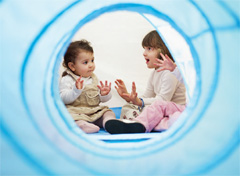Giving Your Child a Head Start
The Importantance of Early Education
by Daniel Beauregard

In decades past, it was common to leave a child at a day care
or preschool and expect little more than that the staff keep him or her occupied while the parents were at work. But as educators learn more about what and how children learn in their first few years, early education has come to mean much more than simply dropping a child at a day care doorstep. Many experts consider the early years, from birth to age 4, to be the most important developmental phase of a child’s life. As a result, it’s vital that children begin their education as quickly as possible. Many early education facilities have standards to maintain, including a curriculum that grows more rigorous
each year.
Many experts consider the early years, from birth to age 4, to be the most important developmental phase of a child’s life. As a result, it’s vital that children begin their education as quickly as possible. Many early education facilities have standards to maintain, including a curriculum that grows more rigorous
each year.“We’re trying to help parents move away from this idea of day care and child care,” says Dr. Laura Johns, director of quality initiatives for Bright from the Start, the Georgia Department of Early Care and Learning. “Every time you put your infant in an early care education program, it’s to stimulate their whole growth, and parents need to understand that the brain is developing at a rapid rate. In fact, we learn more between those ages than any other time in our lives.”
“I always say that we are only as strong as our infant care program, and the reason for that is that’s where it all happens,” says Landy Gonzales, executive director of The Goddard School on Windward Parkway in Alpharetta. “That’s when we’re looking to make sure all the lights are on and the baby is growing according to plan.”
Education and early childhood experts say parents should start looking for an early care center as soon as they’re expecting, so they can get on the waiting list of a high-quality program. Many early care centers take children as young as six weeks, which is usually when parents are returning to work after maternity leave.
Stages of Development
 There are four stages of development children go through that both parents and educators should watch for. The curriculum of any quality early care or pre-K program should feature learning activities that correspond to these developmental stages.
There are four stages of development children go through that both parents and educators should watch for. The curriculum of any quality early care or pre-K program should feature learning activities that correspond to these developmental stages.Cognitive: Teachers read to children, sounding out the words and showing them objects to illustrate their meaning. For toddlers, teachers may engage in hands-on problem-solving activities, such as putting blocks through a cube sorter, asking open-ended questions or coaxing them along the way, which improves literacy and problem-solving skills.
Social: Facilitating a child’s social learning can be as simple as looking into his or her eyes and mirroring the emotions they’re experiencing. The teacher can engage directly with the child, eliciting a back-and-forth interaction between the child’s gestures and the teacher’s responses. With toddlers, this form of interaction may look different. At that age, the social domain of learning focuses more on teaching them how to get along with preschoolers and to take turns and positively engage with each other.
Emotional: Teachers give positive feedback to young children or toddlers and teach them words that validate their emotions: If a child or toddler is crying, teachers can help them understand the words—such as sadness or loneliness—behind their feelings.
Physical: To encourage healthy living from an early age, teachers engage with their students in activities that hone fine motor skills and teach them how to use their fingers to develop writing skills. Toddlers engage in activities such as running outside, jumping and throwing balls to further develop motor skills.
Accreditation
 Although each program is different, many agencies, such as Georgia’s Bright from the Start or the National Association for the Education of Young Children (NAEYC), support programs with a rigorous curriculum and a list of definitive yardsticks, including ratings systems to make sure each program is highly maintained.
Although each program is different, many agencies, such as Georgia’s Bright from the Start or the National Association for the Education of Young Children (NAEYC), support programs with a rigorous curriculum and a list of definitive yardsticks, including ratings systems to make sure each program is highly maintained.“We really put a huge effort on helping family child-care programs and center-based programs understand the components of quality education,” Johns says. “Each one should have intentional teaching practices, lesson planning and learning objectives for all age groups, infancy through preschool.”
Early care and pre-K facilities follow minimum state requirements, but both NAEYC and Bright from the Start take those one step further, ensuring parents get the best early education possible for their child, and remain well-informed along the way.
Bright from the Start oversees the licensing and inspection of approximately 6,000 child care centers throughout the state. This year it unveiled Quality Rated, a volunteer certification program open to any licensed child care center. Quality ratings are awarded to those schools that go beyond Georgia’s minimum licensing requirements.
 Centers that receive Quality Rated certification or NAEYC’s accreditation adhere to such standards as a lower teacher-to-student ratio, higher credentials and qualifications for teachers, engaging parents in support and offering regular assessments, and supporting health, safety and physical activity.
Centers that receive Quality Rated certification or NAEYC’s accreditation adhere to such standards as a lower teacher-to-student ratio, higher credentials and qualifications for teachers, engaging parents in support and offering regular assessments, and supporting health, safety and physical activity.But those aren’t the only rigorous accreditation programs available. The Primrose Schools, with child care education centers open or in development in 21 states, are accredited by the North Central Association Commission on Accreditation and School Improvement or, here in the South, the Southern Association of Colleges and Schools Council on Accreditation and School Improvement (SACS CASI), which also accredit public schools, independent schools and colleges.
Some centers, like The Goddard School, have their own quality assurance programs to ensure accountability. At each of Goddard’s locations, for example, the executive director is required to remain on-site.
“I review curriculum and work with my teachers in the classroom every single day, which really makes a big school seem so much smaller,” Gonzales says.
Enrolling a child in a safe, accredited facility as soon as possible is one of the most important things a parent can do to help that child develop fully, laying the foundation for a successful education.
CHOOSING THE RIGHT FACILITY
If you’ve got a child on the way or have just moved to the area, here are some things to keep in mind as you look for an early care center.
Talk with the teachers. Don’t be afraid to ask questions. Does the center employ qualified staff? Does it communicate regularly with the family about the child’s progress? Does the curriculum foster all areas of a child’s development?
Treat each visit like a job interview. Ask for references and speak with other parents whose children are enrolled. Remember, the center should be doing its best to court you, not the other way around.
Observe what goes on in the classroom. Speak with the teachers and children about what they do each day. Is the center a safe and healthy environment?
Show up unannounced. You should continue to do this throughout the early stages of your child’s education to make sure the center is up to your standards.







